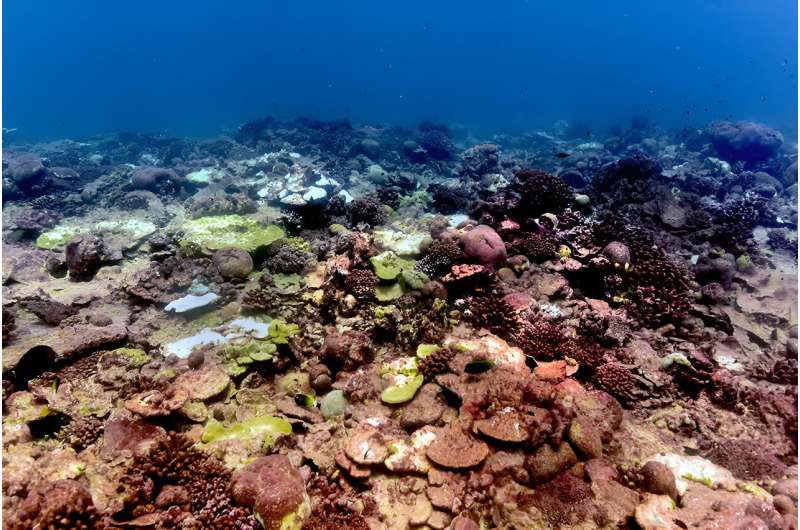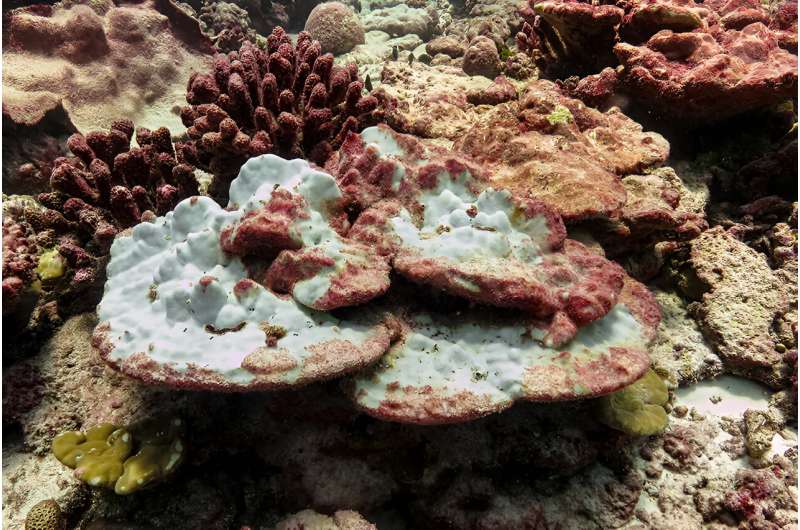This article has been reviewed according to Science X's editorial process and policies. Editors have highlighted the following attributes while ensuring the content's credibility:
fact-checked
peer-reviewed publication
trusted source
proofread
Marine heat wave impact on corals worse than previously thought, according to new research

The effects of marine heat waves caused by climate change on corals and biodiversity are worse than previously thought, according to new University of Victoria research. Published in Science Advances the research also provides important clues about broader coral diversity and marine ecosystem health as the world grapples with record ocean temperatures.
The results come as news media have widely reported unprecedented temperatures in 2023 in places such as Florida. Marine heat waves threaten cryptic coral diversity and erode associations among co-evolving partners is written by Julia Baum, professor of ocean ecology and global change at UVic and postdoctoral fellow Samuel Starko, and colleagues from the US. The paper addresses the global effects of an earlier heat wave (the 2015-to-2016 El Niño) on coral.
Starko, a former UVic postdoctoral researcher with Baum's lab and now at the University of Western Australia, says the study focused on the epicenter of Kiritimati, a coral atoll in the central equatorial Pacific Ocean. It found three genetic lineages among one species of lobed coral and determined they reacted differently to extreme heats.
"Even though the lobed coral appeared to be the most resilient of all coral species, our results demonstrate that one lineage was actually very sensitive and experienced a major reduction in abundance following the heat wave. This highlights how the impacts of extreme events caused by climate change may be even worse than previously thought because they threaten diversity at the genetic level," he says.
Baum, a UVic President's Chair and Provost's Engaged Scholar, says such "cryptic diversity" can be important for the functioning of ecosystems, and the paper notes that "reductions in the diversity of genotypes or lineages may limit the capacity for future adaptation that could help corals withstand, for example, disease or the effects of climate change."

Climate change threatens the world's coral reefs because corals are highly sensitive to small changes in the temperature of their surrounding waters. During marine heat waves, corals release the algae that live in their tissues and produce food for them, causing the coral to turn completely white—a phenomenon known as coral bleaching.
Prolonged bleaching often causes corals to die from starvation. If they can reclaim their food source within a few weeks, they can usually recover. With global climate models predicting that heat waves will continue to increase in both frequency and duration, corals' ability to withstand and recover from bleaching is essential to their survival.
Worldwide, coral reef ecosystems are worth approximately US$375 billion annually, and are a vital source of food and income for hundreds of millions of people in tropical island nations.
Starko says the study's identification of different coral genotypes highlights the potential for increasing coral reef resilience to threats. "There has been an increasing push to use targeted genotypes to restore and future-proof marine ecosystems, including coral reefs," he says. "If we can identify genotypes that are more resilient to heat stress then we can strategically out-plant them to increase the overall resilience of reefs in the face of climate change."
But Baum notes that alone isn't enough to protect corals and ocean biodiversity, saying, "We need to rapidly reduce greenhouse gas emissions to curb planetary warming. The current warming in Florida underscores that the ocean is simply becoming too hot for corals, and we need to act now to mitigate climate change."
More information: Samuel Starko et al, Marine heatwaves threaten cryptic coral diversity and erode associations among coevolving partners, Science Advances (2023). DOI: 10.1126/sciadv.adf0954
Journal information: Science Advances
Provided by University of Victoria


















